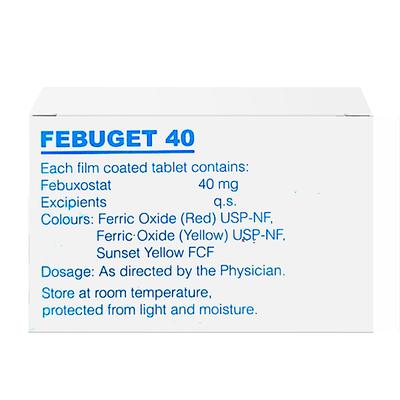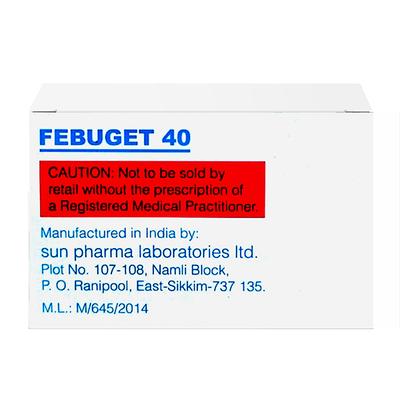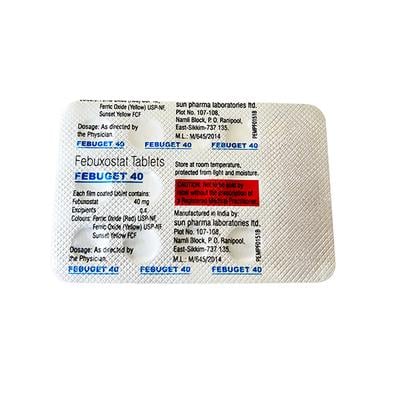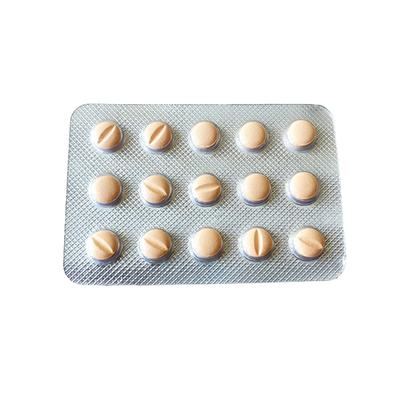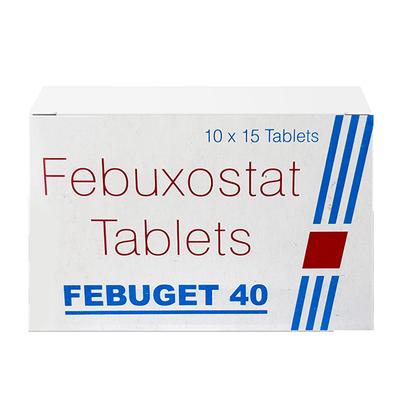

Netmeds First Membership
Quick Links
Introduction About FEBUGET 40 TABLET
FEBUGET 40 Tablet contains Febuxostat 40 mg a medication primarily used to support the management of elevated uric acid levels in adults. Elevated uric acid can arise due to metabolic imbalances and FEBUGET helps by modulating the enzyme responsible for uric acid production, thereby assisting in maintaining balanced serum uric acid levels. This makes it a suitable option for adults who require ongoing support for uric acid regulation, especially when lifestyle measures alone do not achieve the desired balance.
This medication is ideal for adults diagnosed with persistent hyperuricemia, particularly those who need to regulate uric acid levels under medical guidance. FEBUGET works by inhibiting xanthine oxidase, an enzyme involved in the production of uric acid, helping to maintain healthier uric acid levels over time.
It is typically taken once daily with or without food as advised by a healthcare professional. Consistent use as per the prescribed schedule is important for optimal support.
When using FEBUGET, patients should adhere strictly to the dosage instructions provided by their healthcare provider. It’s important to inform your doctor about any other medications you are taking to avoid potential interactions. Certain precautions include avoiding use during pregnancy and breastfeeding unless explicitly recommended by a physician. Patients with liver or kidney concerns should be monitored closely while using this medication. Common side effects may include mild stomach discomfort, nausea, or headache, which generally resolve without needing to stop the medication.
Uses Of FEBUGET 40 TABLET
- Helps in the management of elevated uric acid levels in adults (in conditions like chronic hyperuricemia)
Benefits of FEBUGET 40 TABLET
FEBUGET 40 Tablet supports effective management of elevated uric acid levels in the body. Its benefits include:
- Helps regulate uric acid levels: By reducing the production of uric acid FEBUGET aids in maintaining a healthy balance, which is essential for overall metabolic wellness.
- Supports kidney health: Lowering uric acid can reduce the strain on kidneys, helping to maintain proper kidney function.
- Suitable for patients with certain kidney issues: FEBUGET can be a preferred option when some other uric acid regulators may not be suitable.
- Improves quality of life: By managing uric acid levels patients may experience fewer flare-ups and discomfort related to excess uric acid.
How FEBUGET 40 TABLET Works
FEBUGET 40 helps manage high uric acid levels in the body. It works by blocking an enzyme called xanthine oxidase. This enzyme is responsible for turning certain natural substances (called purines) into uric acid.
When xanthine oxidase is active more uric acid gets produced. FEBUGET slows down this enzyme, which helps reduce the amount of uric acid formed in the blood. As a result, uric acid levels can stay within a healthier range over time.
By helping to control how much uric acid the body makes, FEBUGET supports better metabolic balance and can be an important part of a long-term plan for individuals dealing with high uric acid concerns.
How to use FEBUGET 40 TABLET
Recommended Dosage and Administration of FEBUGET 40
- Take FEBUGET 40 Tablet once daily, or as advised by your healthcare provider.
- Follow the exact dose and duration recommended—do not change it without medical guidance.
- Swallow the tablet whole with a glass of water.
- Do not crush, chew, or split the tablet unless instructed by your doctor.
- Regular blood tests may be recommended to monitor uric acid levels and adjust dosage if needed.
Best time to take FEBUGET 40 tablet
- Can be taken at any consistent time of day—morning or evening works best.
- Choose a time you can stick to daily to avoid missing doses.
Should You Take FEBUGET 40 Before or After Food?
- FEBUGET 40 can be taken with or without food.
- Taking it after a meal may help reduce chances of mild stomach discomfort.
- Choose the option that feels most comfortable unless your doctor advises otherwise. Food does not affect how the medicine works in the body.
What if I forgot to take FEBUGET 40 TABLET
- If you miss a dose of FEBUGET 40, take it as soon as you remember.
- If it is almost time for your next scheduled dose, skip the missed dose.
- Do not take two doses at the same time to make up for the missed one.
- Maintaining a regular daily routine helps in getting the most benefit from the medicine.
- If you frequently forget doses, consider setting a reminder or alarm or speaking with your healthcare provider about tips to stay consist
Overdose
- Taking more than the prescribed dose of FEBUGET 40 may increase the risk of side effects.
- Signs of overdosage are not always obvious but may include unusual tiredness, stomach discomfort, dizziness, or other unexpected symptoms.
- If an accidental overdose occurs, contact your doctor or visit the nearest medical facility immediately.
- Keep the medication out of reach of children and never share it with others, even if they have similar symptoms.
- Do not attempt to "correct" missed doses by taking more than recommended.
Side Effects Of FEBUGET 40 TABLET
Common side effects of FEBUGET 40 Tablet:
- Diarrhea
- Headache
- Skin rashes
- Abnormal liver test results
- Nausea
- Increase in gout symptoms
- Edema (localised swelling)
When to Seek Medical Attention?
Stop taking FEBUGET 40 TABLET and inform your doctor immediately, if you experience any of the following side effects:
- Severe allergic reactions (such as skin rashes, blisters, nodules, itching, swelling of limbs and face, difficulties in breathing, fever, enlargement of lymph nodes)
- Stevens-Johnson-Syndrome (symptoms include reddish target-like spots or circular patches often with central blister on the trunk, ulcers in the mouth, throat, nose, genitals and conjunctivitis, with widespread blistering or peeling of the skin)
- Severe muscle cramps
How To Manage Side Effects
Diarrhea
- Stay well-hydrated by drinking small sips of water throughout the day to prevent dehydration.
- Eat a bland, low-fiber diet (e.g., plain rice, toast, bananas) until the symptoms settle.
- Avoid spicy, oily, or rich foods that may irritate the stomach.
- If diarrhea persists for more than 2–3 days, consult your doctor for further evaluation.
Headache
- Ensure you are getting enough rest and sleep each night.
- Drink plenty of fluids, as dehydration can make headaches worse.
- Try to stay in a quiet, dimly lit environment if the headache feels intense.
- If your doctor approves, you may use a mild pain reliever that is safe for you.
- Report persistent or severe headaches to your healthcare provider.
Nausea And Vomiting
- Take FEBUGET 40 after a light meal or snack, unless advised otherwise.
- Avoid strong smells or rich foods that might worsen nausea.
- Eat small, frequent meals instead of large ones.
- Sipping on ginger tea or sucking on mint lozenges may help reduce queasiness.
- If nausea interferes with daily activities, inform your doctor for further guidance.
Warning & Precautions
Pregnancy
Consult your doctorIt is not known whether febuxostat could affect the growing baby. Therefore, do not take FEBUGET 40 TABLET if you are pregnant or think you may be pregnant without medical advice.
Breastfeeding
Consult your doctorIt is not known whether febuxostat could pass through the breast milk. Therefore, do not take FEBUGET 40 TABLET if you are breastfeeding without medical advice.
Driving and Using Machines
Use with CautionDo not drive or handle any heavy tools or machines if you experience blurred vision, dizziness, sleepiness or any other side effects that can affect your ability to concentrate while undergoing therapy with FEBUGET 40 TABLET.
Kidney
Use with CautionFEBUGET 40 TABLET should be used with caution in patients with kidney diseases. Therefore, consult your doctor for advice before taking it.
Liver
Use with CautionFEBUGET 40 TABLET should be used with caution in patients with liver diseases. Therefore, consult your doctor for advice before taking it.
Allergy
ContraindicatedDo not take FEBUGET 40 TABLET if you are allergic to Febuxostat or allopurinol.
Heart Disease
Use with CautionFEBUGET 40 TABLET should be used with caution in patients with heart problems (such as heart failure). Therefore, consult your doctor for advice before taking it.
Use In Pediatrics
ContraindicatedFEBUGET 40 TABLET is not recommended for use in children and adolescents (aged below 18 years) due to lack of safety data. Therefore, consult your doctor before taking it.
Other Warnings for FEBUGET 40 TABLET
Before taking FEBUGET 40 TABLET, inform your doctor if you:
- have high uric acid levels as a result of Lesch-Nyhan syndrome (a rare inherited condition in which there is too much uric acid in the blood)
- have thyroid problems
Safety Advice
Precautions to Follow While Taking FEBUGET 40
When using FEBUGET 40 Tablet (Febuxostat) it’s important to follow certain precautions to ensure safe and effective use. This medicine is intended for uric acid regulation and specific health conditions may require closer monitoring.
- Inform your doctor about any history of liver, kidney or heart-related conditions before starting FEBUGET.
- Do not stop or adjust the dose on your own. Follow your healthcare provider’s instructions strictly.
- Attend regular blood tests to monitor uric acid levels and liver function while on long-term therapy.
- If you experience skin rashes, swelling or shortness of breath contact your doctor immediately.
- Take FEBUGET at the same time each day for consistent results.
- Avoid high-purine foods and alcohol which can reduce the effectiveness of the medication.
- Pregnant or breastfeeding individuals should use this medicine only if advised by a healthcare professional.
Heart Health Precautions While Taking FEBUGET
FEBUGET 40 has been associated with cardiovascular concerns in certain individuals, especially those with pre-existing heart disease. Monitoring and awareness are key to reducing any potential risk.
- Discuss any history of heart problems, such as chest pain, stroke, high blood pressure, or irregular heartbeat with your doctor before starting FEBUGET.
- Individuals with known cardiovascular disease may need an alternative treatment or additional monitoring.
- Watch for symptoms like chest discomfort, dizziness, or unusual tiredness while on the medication and report them promptly.
- Regular blood pressure and cholesterol monitoring may be recommended during treatment.
- Maintain a heart-healthy lifestyle, including a balanced diet, physical activity, and stress management.
- Do not skip follow-up visits, especially if you have a history of heart attack or stroke
Diet and Lifestyle Advice
Taking FEBUGET 40 Tablet is just one part of managing uric acid levels. A supportive diet and healthy lifestyle can improve outcomes and reduce the chances of sudden uric acid spikes.
Dietary Recommendations:
- Follow a low-purine diet:
Limit intake of high-purine foods such as red meat, organ meats (liver, kidney), sardines, anchovies, and shellfish. - Choose plant-based proteins:
Incorporate lentils, tofu, and beans in moderation. These are less likely to raise uric acid levels than animal proteins. - Increase fiber intake:
Whole grains, fresh fruits, and vegetables help in metabolism and support kidney function. - Stay well-hydrated:
Drink at least 8–10 glasses of water daily (unless advised otherwise). Hydration helps the kidneys flush out excess uric acid. - Limit alcohol consumption:
Especially avoid beer and spirits, as they may interfere with uric acid balance and reduce the effectiveness of FEBUGET. - Cut back on sugary beverages:
Avoid soft drinks and energy drinks with high fructose content, as they may raise uric acid levels.
Lifestyle Tips
- Maintain a healthy weight:
Obesity is linked with increased uric acid levels. Gradual weight loss through proper diet and exercise is encouraged. - Exercise regularly:
Aim for at least 30 minutes of moderate activity (like brisk walking, swimming, or cycling) most days of the week. Avoid overexertion, which may trigger flare-ups in some cases. - Avoid crash diets or fasting:
These can raise uric acid levels suddenly and are not recommended while using FEBUGET. - Monitor your health:
Attend regular follow-ups for uric acid level checks, kidney function, and overall well-being.
How FEBUGET 40 Supports Safe Uric Acid Control in CKD Patients
For patients with Chronic Kidney Disease (CKD), managing uric acid is crucial because elevated levels can put additional strain on already compromised kidneys. FEBUGET works by selectively inhibiting the enzyme responsible for uric acid production, helping maintain a balanced uric acid level.
What makes FEBUGET particularly useful for CKD patients is its unique metabolic pathway. Unlike some other uric acid regulators that rely heavily on kidney elimination, FEBUGET is primarily processed by the liver. This means it can be safer and more effective for patients with reduced kidney function, as the kidneys are less burdened during medication elimination.
Regular monitoring by healthcare providers is important when using FEBUGET in CKD patients to ensure optimal dosing and to avoid any potential side effects. Alongside medication, lifestyle and dietary adjustments play an important role in managing uric acid and supporting kidney health.
Differences Between FEBUGET and Other Uric Acid Regulators for Kidney Patients
|
Feature |
FEBUGET 40 (Febuxostat) |
Other Uric Acid Regulators (e.g., Allopurinol) |
|
Primary Metabolism |
Mainly metabolized by the liver |
Primarily eliminated through the kidneys |
|
Kidney Function Dependency |
Less dependent on kidney function |
Highly dependent on kidney function |
|
Suitability for CKD Patients |
Often preferred in moderate kidney impairment |
Dose adjustment needed; caution in severe CKD |
|
Drug Monitoring |
Requires liver function tests and uric acid level checks |
Requires kidney function monitoring and uric acid checks |
|
Side Effect Profile |
Lower risk of kidney-related side effects |
Potential risk of kidney toxicity in susceptible patients |
|
Dosage Adjustment |
Usually no adjustment in mild to moderate CKD |
Dosage often reduced based on kidney function |
Drug - Drug interaction
FEBUGET 40 Tablet may interact with certain medications, which could affect how either drug works or increase the risk of side effects. It's important to inform your doctor or pharmacist about all the medicines you are currently taking, including prescription drugs, over-the-counter products, vitamins or herbal supplements.
Azathioprine
- Interaction: Co-administration may lead to increased azathioprine toxicity, including bone marrow suppression.
- Management: Avoid using together. Alternative uric acid-lowering therapy may be recommended. Use only under close medical supervision with frequent blood count monitoring if necessary.
Mercaptopurine
- Interaction: FEBUGET may increase blood levels of mercaptopurine, raising the risk of severe toxicity (e.g., bone marrow suppression).
- Management: Contraindicated unless supervised in a specialized setting. Dose adjustment and strict monitoring may be needed if used together.
Theophylline
- Interaction: FEBUGET may increase serum theophylline levels, possibly intensifying its effects or side effects (e.g., tremors, insomnia, nausea).
- Management: Use with caution. Monitor theophylline levels if both drugs are needed. Watch for symptoms of theophylline toxicity.
Didanosine
- Interaction: May result in elevated didanosine exposure when combined with FEBUGET.
- Management: Avoid co-administration if possible. Consider dose adjustment or use of an alternative agent.
Warfarin and Other Vitamin K Antagonists
- Interaction: FEBUGET may slightly enhance the anticoagulant effect of warfarin, increasing bleeding risk.
- Management: Monitor INR (blood clotting test) more frequently when starting or adjusting FEBUGET in patients on warfarin. No dose change typically required unless INR fluctuates.
NSAIDs (e.g., Ibuprofen, Naproxen)
- Interaction: Concomitant use may increase the risk of kidney stress, especially in patients with pre-existing kidney concerns.
- Management: Use the lowest effective NSAID dose. Ensure hydration and renal function monitoring, especially in long-term use.
Rosiglitazone (Antidiabetic)
- Interaction: FEBUGET may increase plasma levels of rosiglitazone via CYP2C8 inhibition.
- Management: Monitor blood glucose closely and consider adjusting the antidiabetic dose if needed.
Drug - Food interaction
When using FEBUGET 40 Tablet, it’s important to be aware of how your diet can influence its effectiveness. While the medicine can be taken with or without food, certain items like alcohol and high-purine foods may interfere with its intended use. Maintaining healthy dietary habits can support better uric acid control. Staying well-hydrated and eating balanced meals is generally advised. Always check with your doctor before making major dietary changes during treatment.
Alcohol
- Interaction: Alcohol can increase uric acid levels, potentially reducing the effectiveness of FEBUGET. Chronic alcohol intake may worsen the underlying condition.
- Management: It is advisable to limit or avoid alcohol during FEBUGET therapy. Occasional intake should be discussed with a healthcare provider.
High-Purine Foods
(Examples: Red meat, organ meats, shellfish, anchovies, sardines, certain legumes)
- Interaction: These foods may contribute to increased uric acid levels, which may counteract the benefits of FEBUGET.
- Management: Patients are advised to follow a low-purine diet as recommended by their doctor or dietitian to support uric acid control.
Caffeine (Coffee, Energy Drinks)
- Interaction: Excessive caffeine may dehydrate the body, which can potentially trigger uric acid imbalances.
- Management: Stay adequately hydrated. Moderate caffeine consumption is typically safe unless advised otherwise by a healthcare provider.
Synopsis
|
Drug |
: |
Febuxostat |
|
Pharmacological Category |
: |
Xanthine oxidase inhibitors |
|
Therapeutic Indication |
: |
Gout and Hyperuricemia |
|
Dosage Forms |
: |
Tablet |
More Information
Storage
- Keep FEBUGET 40 Tablet out of the sight and reach of children
- Store FEBUGET 40 Tablet below 30°C
FAQs About FEBUGET 40 TABLET
Q: What is FEBUGET 40 Tablet used for?
A: FEBUGET 40 contains Febuxostat which helps regulate elevated uric acid levels in the body. It is commonly used to manage conditions related to high uric acid supporting metabolic balance.
Q: Can I take FEBUGET 40 with food or on an empty stomach?
A: FEBUGET 40 can be taken with or without food. However, taking it with meals may reduce mild stomach discomfort for some patients.
Q: Is FEBUGET 40 safe for patients with kidney problems?
A: FEBUGET 40 is primarily metabolized by the liver, making it a suitable option for patients with mild to moderate kidney impairment.
Q: Can I stop taking FEBUGET 40 once symptoms improve?
A: Do not discontinue FEBUGET 40 without consulting your doctor, even if symptoms improve, as stopping may lead to a recurrence of gout attacks.
Q: Is FEBUGET 40 safe during pregnancy?
A: FEBUGET 40 should only be used during pregnancy if clearly needed and prescribed by a healthcare professional.
Q: Should patients with heart disease use FEBUGET 40 cautiously?
A: Patients with cardiovascular conditions should use FEBUGET 40 cautiously and under medical supervision, as some studies have indicated potential risks.
Q: Does FEBUGET 40 require blood tests during management?
A: Yes, regular blood tests are important to monitor uric acid levels and liver function during treatment.
Q: Is it safe to stop taking FEBUGET 40 suddenly?
A: Do not stop without consulting your doctor, as sudden discontinuation can affect uric acid control.
Q: What foods should I avoid while taking FEBUGET 40?
A: Avoid high-purine foods like red meat, organ meats, shellfish, and limit sugary drinks to support medication effectiveness.
Q: Is FEBUGET 40 effective for chronic gout?
A: FEBUGET 40 helps regulate uric acid levels which is key in managing chronic gout, but always follow your doctor’s overall treatment plan.
Q: How often should uric acid levels be checked?
A: Typically, uric acid levels are checked every 2-3 months, or as advised by your healthcare provider.
Q: Is FEBUGET 40 safe for long-term use?
A: Yes, under medical supervision FEBUGET can be part of a long-term uric acid management plan.
Q: Is FEBUGET 40 suitable for elderly patients?
A: Yes, but dose adjustments and monitoring may be necessary due to age-related changes in kidney and liver function.
Q: Can I consume alcohol while taking FEBUGET 40 Tablet?
A: Alcohol can increase uric acid levels, counteracting the medication's effects. It's advisable to limit or avoid alcohol.
Q: Can I exercise while taking FEBUGET 40 Tablet?
A: Regular, moderate exercise is beneficial. However, avoid strenuous activities during gout flare-ups.
Q: Can FEBUGET 40 Tablet be used during acute gout attacks?
A: It's not intended for acute attacks but for long-term management. Other medications are used for immediate relief.
References
1. KD. Tripathi. Essentials of Medical Pharmacology. 7th Edition. Anti-rheumatoid and Anti-gout agents. Page-217.
2. Febuxostat. National Library of Medicine. National Center for Biotechnology Information. StatPearls. [Revised in May 2024]. [Accessed on 20th May 2025] ![]()
3. Febuxostat 80 mg film-coated tablets and Febuxostat 120 mg film-coated tablets. Rivopharm. EMC. UK. [Revised in April 2023]. [Accessed on 20th May 2025] 
4. Febuxostat Tablets 40 mg. Skybiotech Life Sciences Private Limited. [Revised in April 2023]. [Accessed on 20th May 2025] 









